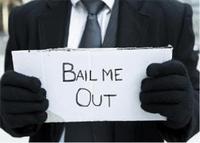Navigating Through the Financial Storm
It has been more than a year since the financial tornado first struck America and consequently the whole world. Is the worst already over, or - as Obama warned on December 6th - is the worst still to come?
We can speculate to no end, but what is certain as Obama's administration enters the White House is that we're a year and a half into the largest financial crisis since the Great Depression, and there is no actual solution in sight. So, maybe it’s time to look at things from a different perspective?
First things first: what is the reason for all the commotion? Most analysts pinpoint the sub-prime mortgage crisis as the catalyst for our financial troubles, but don’t let the words "sub-prime crisis" mislead you. The sub-prime market is not the reason for the collapse; it's only where the crisis surfaced. However, it could just as easily have been the "environmental crisis" or the "humanitarian crisis," or even the "nuclear proliferation crisis."
What really started this snowball rolling was not a financial body of any kind, but rather avarice, uncivilized lust and irresponsible opportunism, or simply said, the human self-centered nature. The only reason it hit the monetary system first is that this system embodies the corrupt nature of people’s relations and interconnections.
Unfortunately, this nature cannot be changed by pouring absurd amounts of taxpayers’ money into the markets. So far, the trillions spent in the United States, England, France, and elsewhere have increased neither the lending nor the liquidity. And it was all done so recklessly that now no one can get the bailed-out companies and banks to admit what they’ve spent the money on. In Naomi Klein’s words, those trillions "went down the drain," just like the billions that slipped through the hands of the big billionaires.
A Crisis of Trust
Money didn’t cause the crisis and money won’t fix it. To cope with today's financial and social challenges, a completely different bailout plan is needed - a plan that bails us out of our own self-centered ways.
Everyone uses the expression, “the stock markets tumbled,” but does anyone even know what this phrase really means? The stock market is, after all, nothing more than a conglomeration of estimations and speculations: a sophisticated platform for successful bets and extrapolations that are immediately translated into rates and indexes. So the stock market is not what collapsed; what really collapsed is the trust between people. Credit companies don’t believe the insurance companies, which can’t rely on the banks, which were disappointed with the real estate agents, who blame the insurance agents for causing the fall of the Average Joe, who was forced, as usual, to pay for all of this. And if all that wasn’t enough, along came Madoff's Ponzi Scheme and shattered whatever trust we had left in the system.
Now, everyone is carefully holding their cards close to their chests, stashing their money back where it used to be in the good old days - under the floor tiles. This is why the seemingly endless spouting of capital has dried up and created what the self-proclaimed mavens refer to as "a liquidity crisis."
Now hold tight. Despite all the above-written, all is not lost. Actually, in the words of the Beatles, "it’s getting better all the time." Why? Because that same trust that appears to be broken was never really there. It was no more than an illusion, which is the real bubble that burst. The situation where everyone is concerned only with personal profits is what brought us to this crisis in the first place. And if real trust doesn’t exist in the world, it’s better to discover it now, before it is really too late.
But this is only the tip of the iceberg. The real bonus that comes with this crisis is that now we are ready to see the world for what it is: one global boat.
A New Navigation System
Two people were in a boat, and one of them took a drill and began to drill a hole beneath himself. His companion said to him: Why are you doing this? He replied: What concern is it of yours? Am I not drilling under myself? The other replied: But you will flood the boat for us both, and we will both sink!
(The great Kabbalist Shimon Bar Yochai, quoted by the ancient Kabbalistic text, Midrash Rabbah, Levitivus 4:6)
In the global boat we all share, whoever thinks he can drill a hole under his own seat and ignore the well being of others is gravely mistaken. The brokers and investors who believed that only their clients would be harmed if their gambles failed are now ploughing the deep water along with everyone else. And by everyone I mean everyone, from the Hypo Real Estate Bank in Berlin and the AIG in New York, to the Chai Ling Shiu and Sons shoe store in North Thailand. If one person drowns, everyone drowns right along with him.
Why is it so important for us to understand this? Because we’re living in a new era, one where trust and mutual consideration require a lot more than lip-service. These are now the laws of the new reality, a reality where we all depend on one another, for better or for worse. From now on, we have no choice but to work together, as one big family. Only then will we be able to navigate our global ship toward the haven of bounty and prosperity.
We have already come to a degree where the whole world is considered one collective and one society. Each person in the world draws his life’s necessities and his livelihood from all the people in the world; hence, he must serve and care for the well-being of the whole world.
(Peace in the World, by Baal HaSulam, the foremost Kabbalist of the 20th century)
